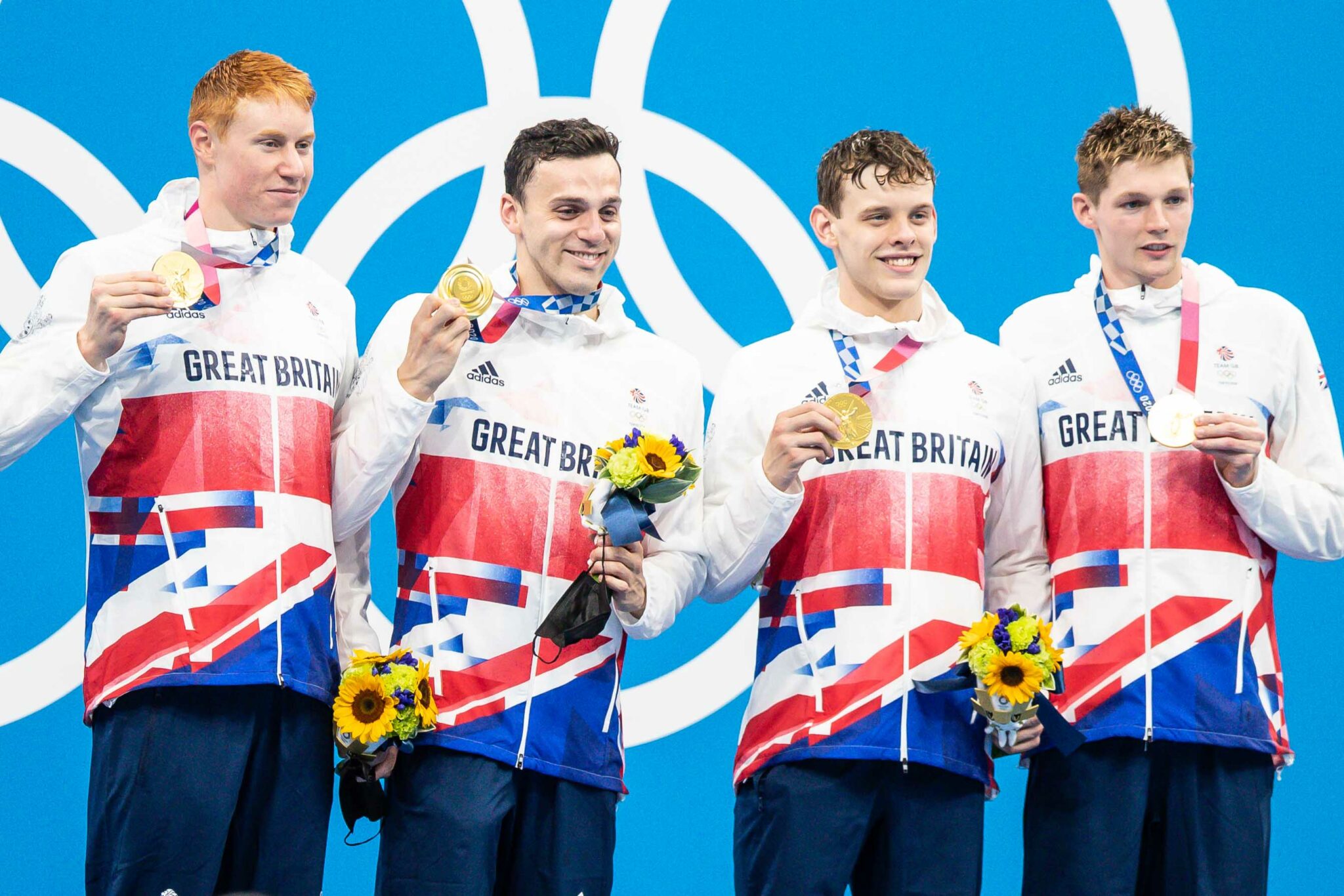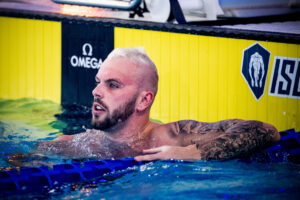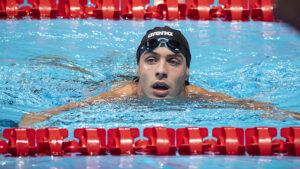
2022 FINA WORLD AQUATICS CHAMPIONSHIPS
Click here to see all of our 2022 World Championship Previews.
By The Numbers:
- World Record: United States (Michael Phelps, Ricky Berens, David Walters, Ryan Lochte) – 6:58.55 (2009)
- Championship Record: United States (Michael Phelps, Ricky Berens, David Walters, Ryan Lochte) – 6:58.55 (2009)
- 2021 Olympic Champion: Great Britain (Tom Dean, James Guy, Matt Richards, Duncan Scott) – 6:58.58
- 2019 World Champion: Australia (Clyde Lewis, Kyle Chalmers, Alexander Graham, Mack Horton) – 7:00.85
Since 1998, the men of the United States, Great Britain, and Australia have won every single 4×200 free World and Olympic title.
First, in the early 2000s, we had the Aussie golden days with swimmers like Ian Thorpe and Grant Hackett carrying their relays to victory. Then, during the Phelps-Lochte era, the Americans were absolutely dominant and set the world record that still stands today. And now, the Brits led by the 200 free 1-2 punch of Tom Dean and Duncan Scott, as well as clutch relay swimmers like James Guy, are the ones at the top.
This year, Great Britain looks to be the favorite to repeat their Olympic gold performance from last year. However, a few things make the circumstances a bit more complicated this time around. Matt Richards, a member of Britain’s finals relay, was well off his best time at trials. In addition, their best swimmer, Duncan Scott, tested positive for COVID-19 17 days before the start of worlds. The United States had three 1:45 mid/low flat starts at their Worlds trials and could be creeping up on the Brits, while the return of Kyle Chalmers (who we originally thought wasn’t going to worlds) is a huge boost for Australia. In addition, the absence of Olympic silver medalists Russia, as they were banned from Worlds by FINA, will shake up the podium a bit.
We come into this race expecting Great Britain to win, but then again, anything can happen.
The British Beasts
Last year, Great Britain were head and shoulders above the rest of their competitors in this race. Even with Olympic champion leadoff Tom Dean being well off his time from the individual 200 free final, him, James Guy, Matt Richards, and Duncan Scott still managed to win by over two seconds and get within 0.03 seconds of America’s supersuited world record from 2009.
On paper, this team is most people’s pick to win. They’ve got the Olympic gold and silver medalists of Tom Dean and Duncan Scott, who have flat start best times of 1:44.22 and 1:44.28 respectively. They also have James Guy, who split 1:44.40 in Tokyo and has been as fast as 1:43.80 on a relay.
But the Brits are going to face some struggles that they didn’t have to deal with last year. At British trials this year, Matt Richards, who split 1:45.01 on the Tokyo relay, finished seventh in a time of 1:48.67. He’s pre-qualified for Worlds by virtue of his relay gold, but this raises questions about whether he’s gonna be at his best in Budapest. If he isn’t, the Brits will likely go with Joe Litchfield, who finished fourth behind Scott (1:45.54), Dean (1:45.73), and Guy (1:46.44) in a time of 1:47.66. Swap his time with Richards’ from last year, and the gap between Great Britain and the rest of the field decreases by 1.66 seconds, which is enough room for another team to come up and challenge them.
Then there’s the question of how much Duncan Scott’s COVID diagnosis will affect Great Britain. Scott is arguably one of the best relay swimmers in the world, backed up by the fact that he clocked a 1:43.45 anchor split in Tokyo, which was the fastest in the field by over a second. If he’s not in peak form, this could also lower the strength of this relay, considering how much he pulled the Brits ahead last year.
If Scott is healthy and Richards in Tokyo shape (or if Litchfield has a huge breakout swim), the Brits are winning by a mile and have another shot at breaking the world record. However, if our concerns play out, they could be very vulnerable for an upset.
America’s Chance At Comeback
I think we can all agree that America’s failure to medal in the men’s 4×200 free relay was a result of poor lineup choices. Zach Apple was placed on last year’s final relay despite having the 100 free semi-final prior to the race, and ended up splitting 1:47.31, significantly slower than the rest of his teammates. Had Blake Pieroni (1:46.21) or Andrew Seliskar (1:46.18) swam their prelims times in place of Apple in the final, the U.S. could have won silver instead of placing fourth. Some even pointed to potentially using Caeleb Dressel instead of Apple, as Dressel clocked a best time of 1:46.63 in the prelims of the 200 free at Olympic trials before scratching the race afterwards.
Kieran Smith (photo: Jack Spitser)
Even with the disappointment of not getting on the podium, there were still flashes of promise on that U.S. Tokyo relay. Kieran Smith had led off in a time of 1:44.74, which made him the third-fastest American ever in the event behind Michael Phelps and Ryan Lochte, and the fastest in ten years. With Townley Haas and Seliskar retiring, Pieroni being out for surgery, and Apple not making the team, this 4×200 free relay is going to be very different from what we have last year- which could be the perfect opportunity to forget about Tokyo and start anew.
The biggest decision that U.S. coaches have to make is who will be that fourth swimmer on the finals relay. Kieran Smith (1:45.25), Drew Kibler (1:45.32), and Carson Foster (1:45.57) are obvious picks for the first three, but then the fourth through sixth place finishers at U.S. trials are just separated by just 0.24 seconds. Trenton Julian (1:46.69), Coby Carrozza (1:46.87), and Trey Freeman (1:46.93) could all swim finals, it’s just a matter of who will prove themselves in prelims.
When you add up the times of top four swimmers from trials, you get a time of 7:02.92 that’s just 0.49 seconds off what the Americans went in Tokyo. If Smith repeats what he did last year, another swimmer or two gets into 1:44 range, and nothing goes horribly wrong, this is the team to look out for in a situation where Britain is not at their best.
Australia Fighting To Stay On Podium

Kyle Chalmers (photo: Giorgio Scala)
The Aussies have been a consistent contender for the medals in recent history, and this year looks to be no different. Yes, they lost their 1:44.74 Tokyo anchor leg in Thomas Neil this year, as he didn’t make the team. In addition, rising 16-year-old star Flynn Southam will opting out of Worlds to focus on Junior Pan pacs. The top four finishers from trials are Zac Incerti (1:45.80), Elijah Winnington (1:46.01), Mack Horton (1:46.70) and Samuel Short (1:47.35), a team with times not exactly worth medaling. However, fear no less, they’ve got Kyle Chalmers back now.
When you put in Chalmers’ 1:45.35 leg from last year in place of Short’s time, you get a two second improvement. In addition, you’ve got Incerti and Winnington who have both been sub 1:46 on a relay/flat start in the last year, and Mack Horton, who anchored in 1:44.85 on Australia’s World Championship winning relay in 2019.
This is a team with a very high ceiling, and with second-place finishers Russia being out of the discussion for this year’s meet, Australia looks like a reasonable lock for medaling unless multiple swimmers are significantly off their best times. Their aggregate time is already third in the world after the USA and Great Britain, and they are likely to be faster than that in Budapest.
Can Italy Sneak Their Way To The Top?
We mentioned that Great Britain, the United States, and Australia will likely be the top three if no team is very off. However, if there is a mishap, it’s going to be very easy for a team like Italy to have a breakout race and pull off an upset.
Last year, the Italians finished fifth with a time of 7:03.24, 1.4 seconds away from a medal. Out of the men on their Tokyo finals relay, Stefano Di Cola, Stefano Ballo, and Matteo Ciampi return this year with trials times of 1:47.55, 1;47.75, and 1:47.97 respectively. However, the top two finishers ended up being Marco De Tullio (1:46.29) by a large margin, and then mid-distance legend Gabriele Detti (1:47.50) following him. The one disadvantage they are at is that Filippo Megli, who split 1:45.33 on the Tokyo relay (the fastest on his team), did not make the roster this year.

Marco De Tullio (Photo: Giorgio Perottino)
From what we saw in Tokyo, Ballo (1:45.77) and Ciampi (1:45.88) are both capable of sub-1:46 splits, and Di Cola (1:46.26) can go 1:46-low. Add De Tullio’s best time from trials into the mix of 1:46-lows as well. However, even with three 1:45s and a 1:46-low, the Italians still finished in fifth last year. What this team needs right now is either an anchor capable of splitting 1:44 to step up and show out big time, or for every swimmer to drop a few tenths off their Tokyo splits. This is going to be less of a challenge as it was last year though, as many of the teams who placed ahead of Italy are either missing stars or have a weakened team.
Germany
A country that *could* have the potential to have a breakthrough race here is Germany, except, with their roster of just eight male swimmers, they didn’t exactly pick their fastest 200 freestylers to be on the team.
Their top two swimmers, Lukas Märtens and Rafael Miroslaw, look very strong. They both exploded onto the scene this year, setting best times of 1:45.44 and 1:46.04 respectively. However the season-bests of Henning Mühlleitner (1:48.88) and Joshua Salchow (1:48.46) are far and away from the times that Martens and Miroslaw can put up. Mühlleitner has never been under 1:47 and Salchow has never been under 1:48, and even if the fastest two Germans put up crazy times, the gap will just be too much to make up for. However, they still look like strong contenders to finish top 8.
What’s interesting about this is that Poul Zellman, a member of the German seventh-place Tokyo relay actually swam faster than Mühlleitner and Salchow this year, finishing second behind Miroslaw in a time of 1:47.45 but not making the team. Zellman split 1:45.80 in last year’s relay in prelims, and he could have been a huge asset to the team this year. Jacob Heidtmann, who anchored in 1:45.49 last year, also did not get selected onto the roster.
The most likely explanation for Zellman and Heidtmann’s absence is that both of them opted out of Worlds. Germany’s 4×200 freestyle relay is not showcasing its full potential in Budapest, so all we can do is speculate about what could have been.
Switzerland
We don’t know what Switzerland’s official roster for Worlds is, but what we do know is that Tokyo sixth-place relay finishers Antonio Djakovic (1:48.89), Noe Ponti (1:48.75), and Roman Mityukov (1:48.86) have swum the 200 free this year. Their fourth relay member, Nils Liess, has raced this year but not in the 200 free.
These times don’t look very great, but they were most likely swam without that much taper or preparation. Last year, Djakovic set a national record at the Olympics leading off in 1:45.77, while Mitykouv anchored in 1:45.68. Ponti and Leiss split 1:46.93 and 1:47.74 respectively to get the Swiss to their national record of 7:06.12. If all four swimmers are going to Worlds and are back in shape, look to see them finaling once more.
Brazil
This Brazilian squad will be led by Olympic bronze medalist Fernando Scheffer, who holds a best time of 1:44.68. He won the 200 free at this year’s Brazilian Trophy Meet in 1:46.18, over a second ahead of the rest of his countrymates.
Behind Scheffer at that meet was Vinicius Assuncao (1:47.22), Breno Correia (1:47.95) and Murilo Sartori (1:48.05). Out of the top four, Assunçoo is the only swimmer that was not on the Tokyo relay that finished eight last year. There were many mishaps on that relay, as Scheffer led off in 1:45.93 over a second off his best time, and Correia split 1:46.87 in prelims and 1:48.11 in finals. However, Sartori still went 1:46 twice, going 1:46.76 in prelims and 1:46.09 in finals.
If nobody adds a significant amount from their best, this Brazilian team will most definitely improve from last place in the finals.
France
France can be a lot faster than what it had in Tokyo, where they finished in tenth and didn’t make the final. First off, Hadrien Salvan clocked a split of 1:48.09, the slowest on his team. This year, he set a best time of 1:46.76 to win the 200 free at French trials. Enzo Tesic, who split 1:46.86 on the Tokyo relay, is also qualified this year. Jordan Pothain led off last year in 1:47.30 but went 1:46.75 individually, showing that he has potential for improvement. And finally, they’ve got Roman Fuchs qualified this year, and he set a best time of 1:47.20 at trials.
Even if the French are missing their 1:46.65 anchor in Jonathan Atsu, the fastest times from the last two years (relay or flat start, whichever is faster) of this year’s team added up are 7:07.57, which is good enough to qualify for the finals had they swam these times at the Olympics.
SwimSwam’s Top 8 Picks:
| Place | Country | 2021 Olympic Finish |
| 1 | Great Britain | 1 |
| 2 | United States | 4 |
| 3 | Australia | 3 |
| 4 | Italy | 4 |
| 5 | Brazil | 8 |
| 6 | Switzerland | 6 |
| 7 | Germany | 7 |
| 8 | France | 10 |
